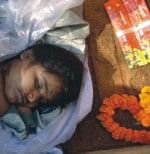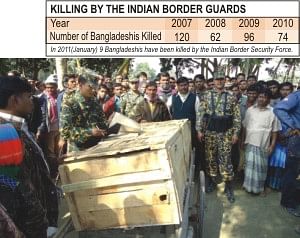|
Special Feature
Love Thy Neighbour
M Abul Kalam Azad
 |
Felani, murdered by the BSF. |
She was not a smuggler. Nor was she an armed terrorist. She was merely a 15-year-old girl returning home, full of dreams of getting married and starting a new life. Young Felani travelled all the way from Assam to reach the Kurigram border, but failed to cross it. A bullet shattered her dreams only few miles away from her ancestral home in Banarbhita village under Nageswari upazila of the district. The Indian border guards shot her dead on January 7.
Felani, who was born and brought up in India, became another victim of mindless firing of the Indian Border Security Force (BSF). Her death has exposed how brutal the trigger-happy BSF solders can be in killing unarmed and innocent Bangladeshi citizens on the borders.
Felani's father Nurul Islam has long been staying in India in search of fortune. Settled in Assam, he runs a betel leaf shop to feed his eight-member family. Felani was the elder daughter among his three sons and three daughters.
Nurul's elder brother Abdul Malek lives in Banarbhita. He arranged for Felani's marriage with Amjad Ali of nearby Kulaghat village. An elated Nurul decided to take his elder daughter home, leaving the entire family in Assam. They reached the Anandapur border point of Kurigram on January 6, but failed to cross the border, as they did not have legal documents. Nurul managed to get hold of an Indian dalal help them cross the border early in the morning the next day. At about 6:00am, Nurul was the first to cross the barbed-wire fence with the help of two ladders.
Felani was tired because of the long journey and overnight-stay. Despite this, she followed her father. While climbing the ladder, her clothes got entangled with the barbed wire. Panicked, she started to shout. The BSF solders in a camp nearby did not miss the opportunity. One of them came forward and shot her in the chest from a close range. She instantly died.
“I fell on the ground when the gunshot broke the early morning silence,” said Nurul, who by that time had managed to cross the border fence. He was frightened and did not flee, Felani had stopped shouting.
“I looked back and found my daughter hanging on the fence. I could not believe my own eyes. I could not save my daughter,” a shattered Nurul told the Star Magazine over telephone.
The next two days were more heartbreaking for him. He was in despair as the rest of his family members were in Assam.
The BSF solders abandoned Felani's body on the barbed wire fence and came at around 11:00am to take it away. The body was handed over to the Bangladesh Border Guards at around noon the next day. She was buried in the village she was returning to after a long time.
“Felani visited us when she was a child, may be when she was seven or eight years old,” said Nayeb Ali, a resident of Banarbhita, “The first time she stayed here for some days. She was coming here not to go back this time.”
Thousands of villagers gathered at the border to receive her body. Enraged villagers staged demonstrations and protested against the killing. They chanted slogans against the BSF and demanded their punishment.
Many of them could not hold back their tears. They said that the government failed to take any action though the BSF, without any provocations, continues to kill and torture Bangladeshis.
“I was very happy about the marriage of my elder daughter. I brought all the little money I had. I also bought some gold for her marriage,” says Felani's devastated father, who was to return Assam after completing the marriage ceremony in 15 days.
Felani's cousin Lal Mia says that everything was prepared for her marriage ceremony, which was supposed to have take place the day after she was trying to cross the border. “We are poor but we had arranged everything for her marriage,” he says.
Nurul does not want to go back to India. “I am not going to go back to the country that is responsible for the death of my daughter,” he says. He has decided to set a grocery shop at a local bazaar first and then bring back his family members.
“I know I will not get back my daughter, but I demand the Bangladesh government's help in bringing back my family from Assam,” he says.
Felani is not the only innocent Bangladeshi to where life has been cut short at the hands of BSF killers. A total of 74 persons were killed by BSF solders on the borders in 2010, 96 in 2009, 62 in 2008 and 120 in 2007. Most of them were innocent and unarmed like Felani, according to Odhikar, a Dhaka-based human rights organisation.
Bangladesh has long been pressing India to stop the indiscriminate firing on the borders. Bangladesh has raised the issue at every bilateral meeting. Every time the Indian side assures of taking steps in this regard. But nothing really happens on the ground as the killing spree goes on unabated. This situation has raised question whether the Indians, as Bangladesh's next-door neighbour, are sincere about their commitment.
At the home secretary-level meeting between Bangladesh and India held in Dhaka on January 19-20, the issue was raised again to seriously draw New Delhi's attention once again. This time the Indian side showed some softness after hearing the story of the Felani's brutal killing by their BSF men. They regretted her killing, but did not apologise. They assured of taking measures to reduce the number of killings on the border.
 |
photo: star file |
“Dhaka made a strong demand to devise modalities for border management to stop indiscriminate firing and killings,” Bangladesh's Home Secretary Abdus Sobhan Sikder told a joint press briefing. He said that the Indian side had pledged to take the necessary measures to stop killings on the borders.
“On the government of India and on my behalf, I deeply regret the deaths of Bangladeshi nationals,” said GK Pillai, the Indian Home Secretary, claiming that the number of deaths was coming down. “Our effort would be to take all necessary steps so that no death takes place on Indo-Bangla borders and this is our commitment to you,” he told the briefing.
Replying to a question, the Indian home secretary said that his government had ordered an independent investigation into the killing of Felani to bring the responsible people to book.
The government's showed a subservient attitude as it took as long as 10 days to lodge a protest with India against the killing of the teenager. However, this did not happen for the first time. The foreign ministry summoned the Indian High Commissioner in Dhaka Rajeet Mitter on January 16, days after the killing, to hand over a protest note.
The ministry also issued a press release on that day saying that the high commissioner promised that he would convey Bangladesh's concern to the Indian government. The envoy also pledged that steps would be taken to prevent recurrence of such incidents on the Bangladesh-India border.
Using non-lethal weapons
In a bid to save lives, Bangladesh made a written proposal to India for the use of rubber bullets, instead of lethal weapons, by the BSF. Dhaka had also worked out the modalities of border management incorporating an option for arrest instead of shooting of anyone who trespass. The modalities were sent to India early last year, but the Indians did not respond to it yet.
An official of Bangladesh Home Ministry has said that the modalities describe how border guards of both the countries should operate without using any lethal weapons. But the Indian home secretary hinted that his country would not consider such a proposal.
“Our BSF solders are coming under armed attack by terrorists elements on the border and suffering injuries,” was his reply when Bangladeshi journalists drew his attention about the proposal at the joint briefing.
As per the Joint India-Bangladesh Guidelines for Border Authorities 1975, the border forces of either country can arrest, try or turn intruders back following necessary communications. Killing of civilians is a violation of the border agreement and international human rights.
Five Bangladeshi nationals have already been killed in BSF firing in the first eight days of this year, two of them on January 8 alone, a day after Felani were killed. Indian authorities always brand everyone they kill as criminals. They claim that most of the killings take place at night and their soldiers shoot only when someone poses threat to them.
Felani was not a criminal and also posed no threat to the BSF. Only time can tell whether the Indian authorities are really sincere about halting killings on the borders.
The two neighbours have border problems since the birth of Bangladesh in 1971. Bangladesh and India signed an agreement in 1974 to manage over 4,000 km of borders. Dhaka immediately ratified the accord but Delhi refrained from doing so. However, India finally agreed to settle the border issues with Bangladesh during Prime Minister Sheikh Hasina's tour to India in January 2010.The two home secretaries declared after their talks that both the countries would be able to resolve all the existing problems in a month or two, before the upcoming visit of the Indian premier to Bangladesh. We hope, this time the promises will not be only on paper.
Copyright
(R) thedailystar.net 2010 |
